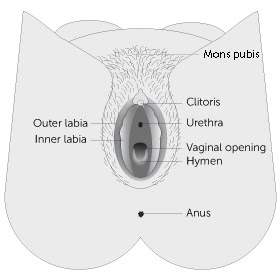Vigina Care
VIGINA


The vagina is a tube of muscle inside a
woman's body that runs from the cervix (the opening of the womb) to the vaginal opening. The vagina is designed to keep itself clean through the help of natural secretions (discharge).
Looking after your everyday health can help keep your vagina in good shape, -(Dr Suzy Elneil, consultant in urogynaecology at University College Hospital, London).
CARE OF THE VIGINA
1). Washing your vagina.
It's a good idea to avoid perfumed soaps, gels and antiseptics as they can affect the healthy balance of bacteria and pH levels in the vagina And cause irritation.
Use plain, unperfumed soaps to wash the area around the vagina gently every day.
The vagina will clean itself inside your body with natural vaginal secretions (discharge).
"During your period, washing more than once a day is also helpful, because keeping the perineal area between the
vagina and anus clean is important, too.
"Good perineal hygiene is necessary by washing that area at least once a day using your normal bathing routines."
"All women are different," says Professor. "Some may wash with perfumed soap and not notice any problems.
"But if a woman has vulval irritation or
symptoms, one of the first things you can do is to use non-allergenic, plain soaps to see if it helps."
2). Scented wipes and vaginal deodorants.
These perfumed products can disrupt the vagina's healthy natural balance. Washing with water and a plain soap should be all you need to keep your vagina healthy. It's normal for the vagina to have a scent.
"Vaginal odour can change at different times of the reproductive cycle and shouldn't always be thought of as being a sign of infection or
illness.
If you're worried about the way your vagina smells, the smell is unpleasant or you're using perfumed products to cover up your vagina's smell, you should see your Doctor. You might have an infection that needs treatment. The most common cause of unusual vaginal
discharge is bacterial vaginosis, which can cause an unpleasant smell. It's easily treated with antibiotics, so see your doctor if you're worried.
3). Cervical screening.
All women aged from 25 to 64 are to go for cervical screening. Being screened regularly means any abnormal changes in the cervix can be identified early on
and, if necessary, treated to stop cancer
developing.
4). Vaginal douches.
A douche flushes water up into the vagina, clearing out vaginal secretions. Some women use a douche to "clean" the vagina. But using a douche can disrupt the normal vaginal bacteria, so it isn't recommended that you use any.
"I can't think of any circumstances where douches are helpful, because all they do is wash out everything that's in the vagina, including all
the healthy bacteria," There's no evidence that douching protects against STIs or vaginal infections, and it may even increase the risk.
5). Bacteria in the vagina.
There are lots of bacteria inside the vagina, and they're there to protect it.
Professor Ronnie Lamont, says: "The vagina contains more bacteria than anywhere else in the body after the bowel, but the bacteria are there for a reason."
>The good bacteria inside the vagina<
*provide "numerical dominance" – they
outnumber other potential harmful bacteria that might enter the vagina
*help keep the vagina's pH balance (how
acidic the vagina is) at an even level, which helps keep the balance of bacteria healthy
*can produce bacteriocins (naturally occurring antibiotics) to reduce or kill other bacteria entering the vagina
*produce a substance that stops invading bacteria sticking to the vagina walls, which prevents bacteria invading the tissues
If the balance of bacteria is disturbed, this can lead to infection and inflammation.
Bacteria called lactobacilli help keep the vagina's pH balance at its normal low level (less than pH 4.5), which also prevents the growth of other organisms.
If the pH of the vagina increases (it gets less acidic), the quality or amount of lactobacilli can fall and other bacteria can multiply.
This can result in infections such as bacterial vaginosis or thrush , which can cause symptoms including itching, irritation and abnormal
discharge.
6). Safer sex.
Some bacteria and viruses can get into the vagina during sex.
These include the bugs that cause chlamydia, gonorrhoea, genital herpes , genital warts , syphilis and HIV.
You can protect your vagina against these infections by using a condom every time you have sex.
............... Thanks .............



Very informative.. worth sharing
ReplyDelete